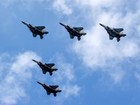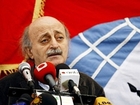After a deadly strike on civilians in the annexed Golan Heights, Israel has threatened retaliation against Lebanon's Hezbollah, accusing it of perpetrating the attack with an Iranian-made Falaq-1 rocket -- part of its wide-ranging arsenal.
Hezbollah has traded near-daily cross-border fire with Israel in support of Hamas since the Palestinian militant group's October 7 attack on southern Israel triggered war in the Gaza Strip.
 Full Story
Full Story
Iran's new President Masoud Pezeshkian has warned Israel against attacking Lebanon as tensions soar over a deadly rocket strike in the Israeli-annexed Golan Heights blamed on Hezbollah.
"The Zionist regime (Israel) will make a great mistake with heavy consequences if it attacks Lebanon," Pezeshkian said during a call with French President Emmanuel Macron, according to the Iranian president's website.
 Full Story
Full Story
The UK has advised British nationals to leave Lebanon and not to travel to the country as diplomats raced to contain any escalation between Israel and Hezbollah.
"We are advising British nationals to leave Lebanon and not to travel to the country. This is a fast-moving situation," Foreign Secretary David Lammy posted on X.
 Full Story
Full Story
Some residents of the Golan Heights village where a rocket killed 12 youths over the weekend protested Monday the visit by Israeli Prime Minister Benjamin Netanyahu and other officials expressing condolences.
Netanyahu is weighing Israel's response to the attack it blames on Hezbollah, which in a rare move has denied having a role. The prime minister laid a wreath, expressed his shock and said the local Druze community has paid a heavy price. He met with representatives of victims' families.
 Full Story
Full Story
Italy's foreign minister told his Israeli and Lebanese counterparts Monday it was "possible to interrupt the spiral of violence" as he reiterated calls for a ceasefire, his office said.
The foreign ministry said Antonio Tajani spoke with both Israeli Foreign Minister Israel Katz and Lebanon's Abdallah Bou Habib, two days after a strike killed 12 minors in the annexed Golan Heights.
 Full Story
Full Story
U.S. Secretary of State Antony Blinken held phone talks with Israeli President Isaac Herzog on Monday to discuss the tensions between Israel and Lebanon following the deadly rocket strike on the Israeli-annexed Golan Heights.
The State Department said Blinken in the call with Herzog “emphasized the importance of preventing escalation of the conflict and discussed efforts to reach a diplomatic solution to allow citizens on both sides of the border between Israel and Lebanon to return home."
 Full Story
Full Story
Hezbollah has started moving precision-guided missiles as Israel threatens to launch an attack on Lebanon following the weekend strike that killed 12 children in the Israeli-occupied Golan Heights.
An official with the Lebanese group told The Associated Press that Hezbollah’s stance has not changed and that the Iran-backed group does not want a full-blown war with Israel, but if war breaks out it will fight without limits.
 Full Story
Full Story
Israel wants to hurt Hezbollah but not drag the Middle East into all-out war, the Times of Israel has quoted two Israeli officials as saying, as Lebanon braces for retaliation after a rocket strike that Israel blamed on Hezbollah killed 12 children and teens in the Golan Heights on Saturday.
Two other Israeli officials said Israel is preparing for the possibility of a few days of fighting.
 Full Story
Full Story
Lebanon’s Druze leader Walid Jumblat has blasted as “lies” Israel’s accusations that Hezbollah was behind the rocket that killed 12 youngsters in the Druze village of Majdal Shams in the Israeli-annexed Golan Heights.
“Where did they bring these proofs and arguments from?” Jumblat added, in an interview on Al-Jazeera television.
 Full Story
Full Story
The Middle East braced for a potential flare-up in violence after Israeli authorities said a rocket from Lebanon struck a soccer field in the Israeli-controlled Golan Heights, killing 12 children and teens in what the military called the deadliest attack on civilians since Oct. 7. It raised fears of a broader regional war between Israel and Hezbollah, which in a rare move denied it was responsible.
The White House National Security Council said it was speaking with Israeli and Lebanese counterparts and working on a diplomatic solution to "end all attacks once and for all" in the border area between Israel and Lebanon.
 Full Story
Full Story



